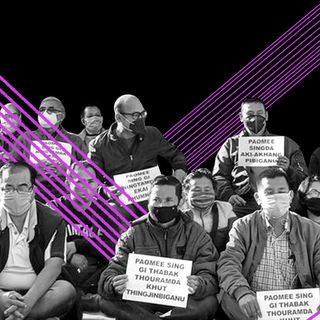
Forced Pregnancy, Marriage Are Now Recognized War Crimes in Latest Hague Conviction
The conviction of Dominic Ongwen expands the world’s understanding of how gender-based violence is used as a war tactic.

Forced pregnancy and forced marriage are now internationally recognized as war crimes upon the recent conviction of former child soldier Dominic Ongwen at the International Criminal Court of The Hague in the Netherlands. The landmark war crimes case expands the world’s collective understanding of how sexual and gender-based violence is used as a tactic of war.
Ongwen, who rose to be a high-ranking commander in the Lord’s Resistance Army (LRA), was convicted on 61 of 70 counts of war crimes and crimes against humanity. A number of these charges were sexual and gender-based crimes including forced pregnancy, forced marriage, rape, sexual slavery, and more, brought by seven women whom he kidnapped and held captive.
Forced pregnancy and forced marriage were a critical tactic within the military operation of the LRA, a rebel militia-cum-personality cult led by Joseph Kony that sought to establish a democratic theocracy in Uganda with Christianity’s 10 Commandments enshrined as law. The LRA terrorized northern Uganda, and parts of South Sudan, the Central African Republic, and the Democratic Republic of the Congo for nearly two decades, reaching a height in the 90s and early 2000s. Many girls and women, especially preteen virgins, in these areas were abducted by the LRA during this time and enslaved as “bush wives” of the LRAs top commanders, Ongwen among them. These girls were closely monitored and considered property, according to a report by CAP International, an organization that fights sexual exploitation, and Watye Ki Gen, an organization of female survivors working to protect and empower children born of the war. The girls were expected to bear and care for children, farm, cook, clean, as well as fight in the LRA — an impossible burden of labor that led to regular psychological and physical torture when a girl failed to meet the demands of her husband-abuser.
Related on The Swaddle:
Report: Sexual Violence as a Weapon of Conflict, Vigilanteism on the Rise Globally
“You have to understand that the whole way the girls were treated was part of their overall strategy. How they controlled girls was an important part of what the LRA did,” a survivor said in the report. Kony had said many times: “We have to fill the world with our children,” and at one point set a goal that each girl enslaved should bear 15 children, the report found.
Ongwen’s conviction marks a coalescing of international legal understanding around sexual and gender-based war crimes that started in 2002 with the Rome Statute, the treaty that established the International Criminal Court. It was “the first international treaty to establish conflict-related [sexual and gender-based violence] as crimes against humanity, war crimes and, in some instances, genocide. These groundbreaking provisions have provided a new language to describe and prosecute these heinous crimes.”
Since then, at least two other war criminals have been convicted of sexual and gender-based war crimes in The Hague: Jean-Pierre Bemba Gombo in 2016, a conviction that recognized rape as a tactic of war, and Bosco Ntaganda in 2019, a conviction that expanded legal definitions of victims of sexual slavery.
The survivors of the LRA’s sexual and gender-based war crimes have had difficulty reintegrating into society, facing social stigma for their abduction and sexual abuse, as well as resentment for their forced participation in carrying out violence against others. Many also have returned HIV-positive or with scars or disabilities from their abuse. Ongwen will reportedly appeal his conviction; if the conviction is upheld, the seven women who shared their stories with the court in an effort to obtain justice for themselves and others may receive financial, educational, and housing reparations out of the ICC’s Trust Fund for Victims.
Liesl Goecker is The Swaddle's managing editor.
Related


IITs Receive More Applications From Marginalized Communities Than Previously Disclosed, New Analysis Finds
